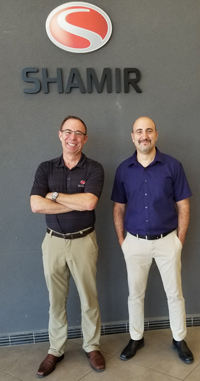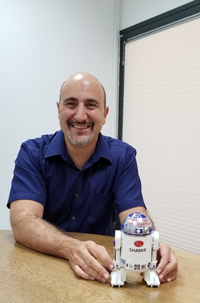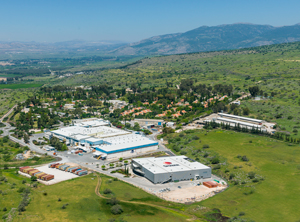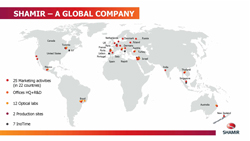 Raanan Naftalovich, left, and Yagen
Raanan Naftalovich, left, and Yagen
Moshe at Shamir Optical Industry’s
headquarters in Kibbutz Shamir, Israel.
Now, Shamir is on the cusp of another technological breakthrough as it prepares to launch its latest progressive lens, Autograph Intelligence. To develop a lens that can adapt to diverse patient needs, Shamir embarked on an extensive research project using methods of big data and elements of artificial intelligence. This research revealed a correlation between patients’ visual needs and what Shamir calls their “Visual Age,” which refers to the physiological age of the eye (the required addition) and is generally correlated with the patient’s chronological age. Prescribing and dispensing the lens is simple, and eliminates the need for questionnaires or time burdensome applications, according to Shamir, which plans to launch Autograph Intelligence next week at Vision Expo. The new design will be available from a select group of validated Shamir Partner Laboratories on October 1, 2018.
But Shamir’s vision extends beyond lenses. The company is taking what it’s learned through making and marketing lenses and applying it to new optical businesses. It is focusing its efforts on products and services designed to improve the customer experience for eyeglass wearers.
A good example of this approach is InoTime, a rapid delivery service that enables tourists, business people on their lunch break or those who lost or broke their glasses to visit a local eyecare professional and get new Rx lenses in as little as three hours. To accomplish this, Shamir has designed special labs that use advanced lens processing technology to produce personalized Rx lenses, both progressive and single vision, which are delivered to the ECP or, if needed, directly to the consumer.
Over the past four years, Shamir has set up InoTime labs in seven cities around the world including New York and Toronto, and plans to expand the service into other markets.
 Yagen Moshe used this robot to symbolize
Yagen Moshe used this robot to symbolize
how Shamir applied artificial intelligence
to design its groundbreaking new lens,
Autograph Intelligence.
The team responsible for Shamir’s many innovations consists of optics experts, mathematicians, engineers, technicians and other specialists. Through collaborations with other professionals at international academic and medical institutions, they research solutions to vision problems as well as a wide spectrum of health and wellness issues.
Shamir’s willingness to share its expertise with like-minded collaborators both inside and outside of the optical industry recently took on a broader dimension with the launch of a new initiative aimed at combatting poor vision among people in Israel and in other parts of the world. The company is committing resources toward this goal, and has begun to reach out to potential partners who can benefit from its knowhow.
To get a better understanding of these new initiatives and get an inside look at the development of Autograph Intelligence, VM editors Marge Axelrad and Andrew Karp travelled to Shamir’s headquarters in Upper Galilee, Israel. On a hot, cloudless day in late July, they talked with Yagen Moshe, the new president of Shamir Optical Industry, and Raanan Naftalovich, president of Shamir North America.
Moshe joined Shamir Optical in 2005 as a financial controller and was appointed chief financial officer in 2006. In 2013, he was named chief operating officer and, in 2014, deputy CEO and CEO of Shamir Asia. Under his leadership, business in Shamir Asia increased contributing to the overall growth of Shamir Optical. He became president and CEO of Shamir Optical Industry on July 1, 2018.
 A view of Shamir’s headquarters
A view of Shamir’s headquarters
as seen from the Golan Heights.
This interview was edited for length and clarity.
Vision Monday: Is Autograph Intelligence a global launch for Shamir? If so, is the U.S. the first market?
Yagen Moshe: Every design that we are creating is a global design for Shamir, and it’s a global method we are promoting. The U.S. market is always the pioneer for Shamir. First, it’s the biggest market in the world, in the optical industry, both in quantities and in value. Second, because of the name of Shamir, we can promote it in the right way and learn how to do it for other markets. We learn from the relationships we have with our partners, the ECPs. However, if we’re doing a myopia lens and design, then we’re doing it in Asia, because that’s where we have the most customers.
We’re just starting the journey with Autograph Intelligence. In the future, we may find that, because of culture and environment, we will get some solutions that will fit for Asia, some for Australia, and some for the U.S.
Raanan Naftalovich: This is the beginning of using artificial intelligence to give a different solution to different needs in the world, including culture. There are people who are reading top to the bottom, and people who are using the computer much more than others. We will give it much more attention in the future.
VM: Will this new technology platform obsolete any of Shamir’s existing platforms, such as Eyepoint Technology or As-Worn Quadro? Or does Autograph Intelligence incorporate some or all of those technologies?
RN: We are building on these technologies, but we’re not afraid to look at move ahead. When we brought out the freeform, and it got enough attention in the market, we started selling semi-finished progressive lenses. Why?
Because freeform can do a way better job. We hope that all of our customers will migrate into the new technology. But we’re not going to discount Autograph III. It will have a segment in the market. But if you want to be on the edge of technology, take Autograph Intelligence.
VM: Using artificial intelligence to design Autograph Intelligence shows how Shamir is embracing technology inside and outside of the optical space. How does Shamir go about this process? Do you do have a team that does reconnaissance in other fields?
YM: We learn what’s going on in other fields. When we want to learn something, we are focusing a team. Some of the R&D and innovation team are not from the optical industry.
 Click here to view some facts
Click here to view some facts
and figures about Shamir.
We also know that there are a lot of academics working in health institutions who say that for people with diabetes, you can control the level of sugar in the blood by focusing of their vision. You need special lens designs to give the brain instructions. This is an example that we see something in the world, where the health and treatment is going, and we want to be part of it.
We see what’s going on in the lifestyle experience of consumers, and we want to apply our experience and optical knowledge to create solutions. We must be very thankful that we are sitting in Israel, and most of the startups in other industries are coming from Israel. So today, we take as a mission to make a connection between Shamir and technology that is being developed. That may mean forming partnerships or making acquisitions.
VM: Do you have companies from outside the optical industry that come to Shamir looking for technology solutions?
YM: Yes. Recently, a Portuguese institution approached us looking for vision solutions to certain health problems. So last month, I had two meetings with doctors from health institutes in Israel. They feel it’s very important to find out how filters on lenses may influence the body. We have high level specialists here, and we can help them and support them with our knowledge.
RN: One of the inspirations that we got when we started exploring artificial intelligence was from the field of predictive medicine. Researchers are using a lot of data and AI to try to predict what kind of diseases people will have in 20 years. We went into our data base and noticed some big variations. We’re not sure what is it yet, but there’s something there.
YM: Another way we’re contributing in the realm of healthcare is to make precision optics for various kinds of instruments. Today, we are collaborating with several companies that make medical devices.
RN: In the last few years, Yagen was constantly keep pushing us to go in this direction. Now that he’s the leader, in a very short time, he’s making sure we have the resources to move forward even faster. The direction is very clear, we are moving more and more into healthcare solutions.
VM: There is a growing intersection of augmented reality and optics. Is Shamir also involved in AR technology?
YM: Yes, we are doing a project with one of the big companies in AR.
VM: Why did Shamir get into the safety eyewear business? It seems what you’re doing is not necessarily about traditional industrial safety eyewear.
RN: Yagen was personally responsible for acquiring this company in Australia, Eyres. What we saw was the potential to combine our knowledge of optics to create a lens design for those frames that would look very fashionable while providing right optics and filters for hobbies.
For example, if you’re doing carpentry work in your home, or working on a hobby, and there is a certain area that you’d like to see more than anything else, you’ll have the right vision. If you are working on the computer, and you have two screens, we have a lens called Workspace that covers both of them. We also have a safety solution for consumers while they’re working at the computer. It’s a blue light blocker without the yellowness so it doesn’t look weird. Or, suppose you’re working in the garden. You need glasses with enough impact resistance so that if something flies into your eyes, you will not get hurt. And we’re meeting all the safety standards for optical lenses designed for military and industrial use, such as drop ball and heat resistance. This is the right product to get the best vision correction without compromising your safety.
VM: With this new orientation to a changing world, where tech is transforming everything, can you explain Shamir’s point of view and its priorities?
YM: We are looking at the C(onsumer) to better support the B(usiness). But we are not forgetting who is our partner, the ECP.
RN: Another layer is that we want to change the retail experience in the store. We feel that the optical industry is way in the back when it comes to the retail experience. You are getting glasses that cost $1,000 when you add the Transitions lenses, the AR coating and the Autograph Intelligence design with a Chanel frame. Then I’m coming to mark your lenses with my felt pen, and then you have to wait 10 days to get your glasses. Then I have to talk with Mary who’s sitting in the front who has no clue about optics, about what the insurance will pay me. When you ask people about what they don’t like about the optical industry, they don’t like to go through all this pain to get their glasses. Shamir is taking it very seriously. We are looking at the consumer and we want to help our partners to be much better for them. You don’t have to wait 10 days for your glasses. You can get it in the same day or the following day. That’s part of the service we can provide. When you come into the store, we’re going to use Spark (an advanced measuring device) to measure you, and not a pen. When it comes to explaining to you what you’re getting, we will do it. On the back end, we will do all the hard work with the artificial intelligence to bring the right product in.
Shamir is also looking at what we can contribute to society. We just appointed one of our senior executives, Dagan Avishai, to manage a new mission to improve poor vision.
YM: For example, there is an institution that supports kids that have cancer. When they have this disease, it affects their vision. When they’re not getting the right vision correction, their lifestyle is damaged. Our donation is not money, though. We want to be in a situation where Shamir employees can help. It’s very important to us as a company.
Our mission is to not only about sell products, but also to bring the knowledge to the people about how much vision is important and how much it contributes in terms lifestyle. We can push institutions in Israel’s government and other institutions to create regulations to support correcting poor vision. We have the power to do that. Then we can raise awareness through professional articles that we will publish in the newspapers. We can also promote change through action, not through opticians and eye doctors, but through ordinary people, young people. It’s very simple. When you have the awareness, you can improve the lifestyle.
People are suffering at a young age. People, compared to 10 years ago, more young people today need eye correction. It’s because of the new technology, part of this change in the world, that’s affecting vision. They’re looking at things from angles and distances they never had to use before. So part of our mission is to raise awareness of this problem in the schools. Some young people don’t even know they have vision problems that may be influencing their grades. We need to bring this knowledge and awareness to young people and their parents.
Company: Shamir Optical Industry
Headquarters: Kibbutz Shamir, Israel
President/CEO: Yagen Moshe
Annual Revenue in 2017: $249 million
Global Footprint: Shamir markets its branded lenses in 22 countries. It operates 19 optical labs and two production sites.
Global Workforce: Approximately 2,200 employees.
Ownership: Jointly owned by Kibbutz Shamir and Essilor since 2011.